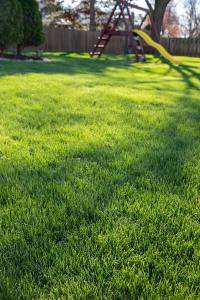The All American Lawn is Changing
 We may not realize it, but there is a cultural war brewing. I realize this is not the best opening line based on the current state of our society. This cultural war is much different. It is the debate over the future of the All-American lawn.
We may not realize it, but there is a cultural war brewing. I realize this is not the best opening line based on the current state of our society. This cultural war is much different. It is the debate over the future of the All-American lawn.
The zest for the picture-perfect lawn took root during the growth of the suburbs in the 1950’s, when owning your home and tending your plot of land became the American dream. Manicured lawns trace their roots back to England where high society made lawns a symbol of their wealth.
The American lawn has evolved over the years as research improved cultural practices. Pesticides and fertilizers made it easier to achieve perfection. Although inputs made it easier to grow a monoculture of grass, it may have become an unrealistic goal to have a weed free, pest free carpet of green.
The problem is that monocultures; defined as all one species, go against nature. Nature thrives on rich diversity. Diversity supports a wide range of beneficial plants, insects, and animals, that all interact as part of a healthy ecosystem. Any species invading a monoculture is a threat and could be considered a pest. It must be eradicated.
A movement has been growing for the past few years to move away from the idea of a beautiful green carpet lawn as the ideal monoculture. Instead, we are seeing more people accepting a less than perfect or a much different look.
Does every weed need to be killed? Is a weed potentially a food source for a beneficial insect, or a pollinator? Does fertilizer have to be required to help the grass grow more? The consequence is frequent mowing which releases harmful carbon into the atmosphere. Does the lawn need to be watered during times of drought? What’s wrong with a brown lawn? All good questions, and like most not always a simple answer.
The new All-American lawn ranges from the carpet of green, to a few weeds, a mix of plants, bee friendly practices, or even removing turf and planting a range of native plants. These changes will force us to think differently. They will cause us to be more accepting. They will cause us to rethink property values. They will require cities and HOA’s to rewrite codes to be more acceptive of this diversity.
Since diversity is good for a healthy environment, I ask this question? Is there anything wrong with everyone having their own unique vision of a beautiful lawn? Gone are the days where lawns are a cookie-cutter and treated the same with the green carpet goal. The movement is the lawn is a personal choice. Beauty and function should be in the eye of the beholder, not societal pressures.
As with any movement we can go too far. There is value in a lawn or ground cover. They prevent soil erosion and help to protect our water. They have a cooling effect and much more. Most importantly they provide a place for us to play, relax, and escape the world.
A lawn or ground covering is a must for a healthy environment. Each of us must decide our definition of a lawn. No matter your style or goals it will take inputs and maintenance to be successful. Just simply walking away from maintaining a lawn ground cover is not an option.
Do You Have Questions?
Have questions? The Garden Hotline is staffed by trained EMG volunteers and Extension staff who will assist you with questions.
Phone: (913) 715-7050
Email: garden.help@jocogov.org
